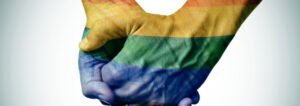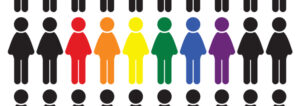Increasing workplace diversity
- 5 Min Read
Marking National Coming Out Day 2018. to say that diversity in the workplace is important is an understatement. To get the best from a workforce, organisations need to create an environment where individuals feel that they can bring every aspect of themselves to work.
- Author: Kim Newell
- Date published: Oct 11, 2018
- Categories

To say that diversity in the workplace is important is an understatement. To get the best from a workforce, organisations need to create an environment where individuals feel that they can bring every aspect of themselves to work.
 For a company such as State Street, inclusion and diversity goes to the heart of our business. To be a truly client-focused organisation, we need to reflect our clients and their clients too. They need to see State Street as an organisation that is as diverse as they are. And as the world changes, and as investors and their life goals evolve, we need to be in line with such trends.
For a company such as State Street, inclusion and diversity goes to the heart of our business. To be a truly client-focused organisation, we need to reflect our clients and their clients too. They need to see State Street as an organisation that is as diverse as they are. And as the world changes, and as investors and their life goals evolve, we need to be in line with such trends.
Courageous Conversations
Whether you’re LGBTQ, a person of colour, or any other traditionally marginalised group, chances are you’ve experienced being reduced to the role of a spectator: a situation that left you feeling as though your contributions weren’t valued because your identity or background differed from those around you. Sometimes such situations occur when a colleague or superior commits what’s known as a ‘micro-aggression’: a casual remark that, however unintentional, reveals unconscious bias or prejudice.
For example, the Human Rights Campaign Foundation recently revealed that more than half (53 percent) of LGBTQ workers report hearing jokes about lesbian or gay people at least once in a while; and 1-in-5 LGBTQ workers report having been told, or had co-workers imply, that they should dress in a more feminine or masculine manner[1].
When micro-aggressions or other forms of exclusion happen in the workplace, it’s not just bad for the individuals involved – it’s bad for business. For example, the minute you tell someone that you don’t care who they are, you render them less relevant, perhaps even invisible. It’s actually better to show that you care about and recognise a person’s unique background and experience. That’s part of what makes a workplace feel inclusive; true inclusiveness means valuing differences even as you seek common ground. And, when an employee feels included in a workplace, it can bolster performance.
It is clear that although businesses are making progress in emphasising diversity in their hiring and promotion practices, true inclusion – the kind that can’t be measured by headcounts – remains a challenge. So how do we address it? Unfortunately, acceptance and recognition cannot happen overnight, but companies can take necessary steps to help foster an inclusive workforce.
Back to basics
It’s important for companies to have both formal training and informal, honest discussions about what it means to be inclusive, to value differences and treat others with respect and dignity.
We’ve all seen research demonstrating consistent outperformance of groups that include colleagues with varied expertise, backgrounds and perspectives. So while the business case is clear, the concept of strong LGBTQ role models – or allies – is critically important to effectively embed inclusion and diversity into the fabric and culture of our organisations.
However, a culture of allies has to reach all the way to the top of the organisation to be truly effective – visibility is key. Employees must feel that there is a cohort of strong allies, to allow them to be more confident about being out in the workplace. After all, it’s not just the responsibility of LGBTQ people to create a workplace culture that is inclusive of everyone. The more leaders become aware of diversity issues, including micro-aggressions and unconscious biases, the better equipped they will be to foster inclusion and more effectively lead diverse teams.
I’ve experienced first-hand the positive effects that a mentor or role model can have on career development. It made me realise that we need to embed the concept of allies into our inclusion programme.
The State Street Global Ally Programme is about raising awareness and educating all of our employees about our LGBTQ community, while supporting our LGBTQ employees and creating a workplace of equality. It has encouraged our senior managers to be vocal, visible LGBTQ allies.
Our values and behaviours are driven by the role models we see. If you’re able to look up and see that people at the top are supportive, you’re more likely to be confident in asserting yourself and challenging things. Our programme helps to engage, educate and empower our employees to continue to drive LGBTQ inclusion in their locations now and into the future. As responsibility does not lie with one individual, it can range from being a leader of an organisation that puts equality – including LGBTQ equality – at the heart of the business, to being a junior member of staff who challenges discriminatory banter among colleagues.
Beyond the boardroom
While workplace conversations remain vital for fostering a welcoming, respectful environment for all employees, it is also important to support the LGBTQ community at large. I’m an executive sponsor for State Street’s EMEA Pride Network, and one of our main beliefs is that corporations should lead by example and promote the rights of LGBTQ colleagues around the world.
In the US, State Street Global Advisors was a signatory on a letter to Texan law makers about the Transgender Bathroom Bill and we have launched a Transitioning at Work policy. Our employee policies and benefits are LGBTQ-inclusive and we have Pride networks established in offices globally, in an effort to promote an inclusive working environment for all employees.
Far from over
While progress has been made, there is still work to be done. But one thing is for sure, at State Street, we’re greeting people of all backgrounds with open minds and open arms. Good human beings care about people, and smart companies do too.
[1] Human Rights Campaign Foundation, A Workplace Divided: Understanding the Climate for LGBTQ Workers Nationwide
By Kim Newell Chebator, Chief Administrative Officer, EMEA









